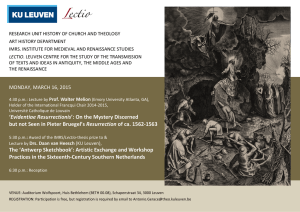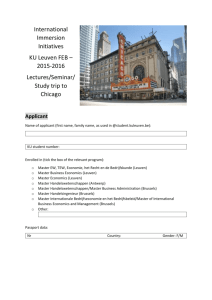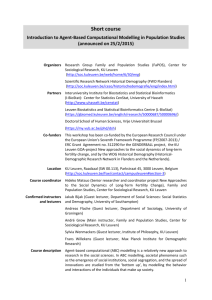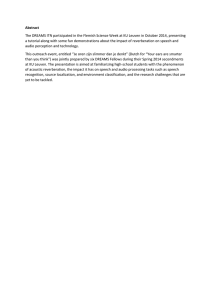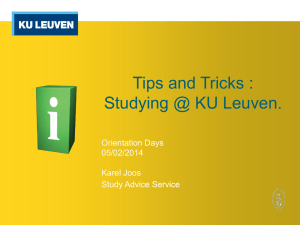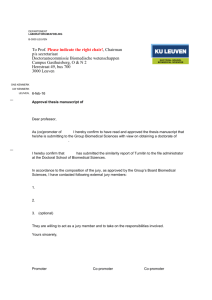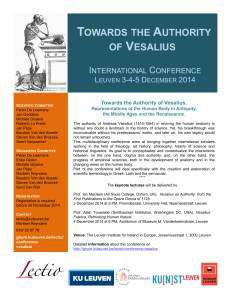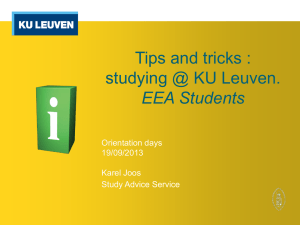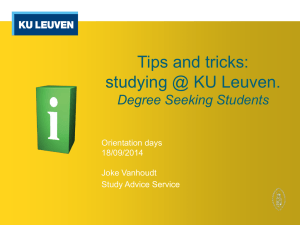dsh_2015_06_1-5_abm_course_general_description
advertisement
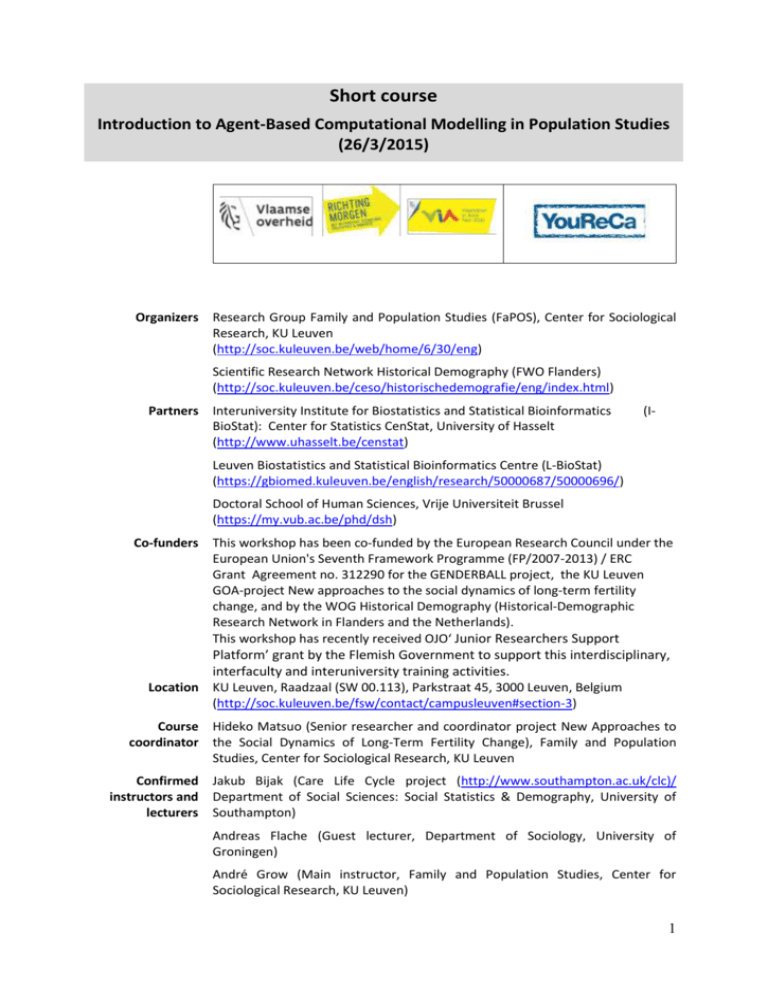
Short course Introduction to Agent-Based Computational Modelling in Population Studies (26/3/2015) Organizers Research Group Family and Population Studies (FaPOS), Center for Sociological Research, KU Leuven (http://soc.kuleuven.be/web/home/6/30/eng) Scientific Research Network Historical Demography (FWO Flanders) (http://soc.kuleuven.be/ceso/historischedemografie/eng/index.html) Partners Interuniversity Institute for Biostatistics and Statistical Bioinformatics BioStat): Center for Statistics CenStat, University of Hasselt (http://www.uhasselt.be/censtat) (I- Leuven Biostatistics and Statistical Bioinformatics Centre (L-BioStat) (https://gbiomed.kuleuven.be/english/research/50000687/50000696/) Doctoral School of Human Sciences, Vrije Universiteit Brussel (https://my.vub.ac.be/phd/dsh) Co-funders This workshop has been co-funded by the European Research Council under the European Union's Seventh Framework Programme (FP/2007-2013) / ERC Grant Agreement no. 312290 for the GENDERBALL project, the KU Leuven GOA-project New approaches to the social dynamics of long-term fertility change, and by the WOG Historical Demography (Historical-Demographic Research Network in Flanders and the Netherlands). This workshop has recently received OJO‘ Junior Researchers Support Platform’ grant by the Flemish Government to support this interdisciplinary, interfaculty and interuniversity training activities. Location KU Leuven, Raadzaal (SW 00.113), Parkstraat 45, 3000 Leuven, Belgium (http://soc.kuleuven.be/fsw/contact/campusleuven#section-3) Course Hideko Matsuo (Senior researcher and coordinator project New Approaches to coordinator the Social Dynamics of Long-Term Fertility Change), Family and Population Studies, Center for Sociological Research, KU Leuven Confirmed Jakub Bijak (Care Life Cycle project (http://www.southampton.ac.uk/clc)/ instructors and Department of Social Sciences: Social Statistics & Demography, University of lecturers Southampton) Andreas Flache (Guest lecturer, Department of Sociology, University of Groningen) André Grow (Main instructor, Family and Population Studies, Center for Sociological Research, KU Leuven) 1 Sylvia Wenmackers (Guest lecturer, Institute of Philosophy, KU Leuven) Frans Willekens (Guest lecturer, Max Planck Institute for Demographic Research) Course Agent-based computational (ABC) modelling is a relatively new approach to description research in the social sciences. In ABC modelling, societal phenomena such as the emergence of social institutions, social segregation, and the spread of innovations are studied from the ‘bottom up’, by modelling the behavior and interactions of the individuals that make up society. An increasing number of scholars advocate the use of ABC modelling in population research. The premise is that ABC modelling offers a number of benefits, such as: (1) Enhanced theory formation by better linking the micro-level with the macro-level. (2) The ability to represent populations more adequately as complex systems. (3) Providing a laboratory in which rare events and the implications of alternative mechanisms can be studied. The increasing number of ABC modelling studies published in the main scholarly journals in population studies shows that the merits of the approach receive increasing recognition in the field. Yet, at the same time many scholars are still reluctant to employ ABC modelling in their own research. Important reasons for this are: (1) Lacking understanding of the benefits of the method. (2) Lacking knowledge about the types of research questions that can be fruitfully addressed with ABC modelling. (3) Lacking experience and training in simulation modelling and software development. The goals of this course are: (1) To introduce participants to ABC modelling in population studies. (2) To provide them with theoretical background on ABC modelling and to provide them with an understanding of its benefits and uses. (3) To make them acquainted with the most important concepts and tools in developing agent-based models. (4) To introduce participants to NetLogo as a platform for designing their own agent-based models. Learning The course will provide participants with knowledge in four areas: outcomes (1) Participants will learn about the benefits of agent-based models and about the type of research questions that can be addressed with such models. (2) They will know about existing agent-based models in different areas of population research, such as mate search, fertility, and historical demography. (3) They will be able to develop basic models of population dynamics with the modelling platform NetLogo. (4) They will be able to design and analyze systematic computational experiments for answering research questions. 2 Course setup The course consists of five full days, each with a morning session (09:00 12:00) and an afternoon session (13:00-16:00). Sessions are based on a mixture of lectures and computer labs. On the last day, there will be group discussions in which participants present mini-proposals for using ABC modelling in their own research. During this session, participants will receive feedback from instructors and other participants. Lectures and computer labs will take place in the Raadzaal at the Faculty of Social Science building. Students need to bring their own laptop for participation in the computer labs. Course overview/ Day 1 (Monday, June 1) schedule Morning: Guest lecture Afternoon: Guest lecture Welcome dinner with guest lecturers and participants Day 2 (Tuesday, June 2) Morning: Computer lab Afternoon: Computer lab Day 3 (Wednesday, June 3) Morning: Computer lab Afternoon: Computer lab Day 4 (Thursday, June 4) Morning: Guest lecture Afternoon: Computer lab Day 5 (Friday, June 5) Morning: Participant presentations and group discussions Afternoon: Participant presentations and group discussions Closing event: Guest lecture Requirements Participants need to submit a one-page mini-proposal in which they outline their interests in/plans for applying ABC modelling. The proposals should include information such as participants’ field of study, their study focus/research questions, theoretical frameworks to be used in their research, potential data sources, and expected outcomes. This proposal will be used as a basis for group discussions on day 5. 3 Application Those who are interested in participating in the course should apply with procedure the following documents to the course coordinator (Hideko.Matsuo@soc.kuleuven.be): (1) Biographical information. (2) For PhD candidates, a statement of support from their supervisor. (3) One-page mini-proposal. The early bird application deadline is February 20 2015; feedback about acceptance will be send out by March 15 2015. The regular application deadline is April 1 2015; feedback about acceptance will be send out by April 15 2015. All submitted documents will be assessed through the scientific committee (FaPOS/I-BioStat/L-BioStat). Incomplete applications will not be considered. Admission and fees The number of participants is limited to 15. Selection will be based on the content of the mini-proposal. Priority will be given to those who have applied for the early bird deadline. The course fee is 300€ (students affiliated at Flemish universities - see below). The fee includes lectures, computer labs, luncheons, coffee breaks, a joint dinner, and a closing reception. Participants need to pay for their own accommodation and travel expenses. The course fee is waived for doctorate researchers affiliated at Flemish universities and will be financed by OJO ‘Junior Researchers Support Platform’ funds by the Flemish Government. General readings Billari, F., & Prskawetz, A. (Eds.). (2003). Agent-Based Computational Demography – Using Simulation to Improve our Understanding of Demographic Behavior. Heidelberg: Physica Verlag. Epstein, J. M., & Axtell, R. L. (1996). Growing Artificial Societies: Social Science from the Bottom Up. Washington, D.C.: Brookings Institution Press/MIT Press. Gilbert, N. (2008). Agent-Based Models. Thousand Oaks: SAGE Publications. Macy, M. W., & Willer, R. (2002). From Factors to Actors: Computational Sociology and Agent-Based Modeling. Annual Review of Sociology, 28, 143–166. Macy, M. W., & Flache, A. (2009). Social Dynamics From the Bottom Up: Agent-Based Models of Social interaction. In P. Hedström & P. Bearman (Eds.), The Oxford Handbook of Analytical Sociology (pp. 245–268). Oxford: Oxford University Press. Location of the workshop The workshop will take place in the Raadzaal (SW 00.113) at the Faculty of Social Sciences, Parkstraat 45 in Leuven. The Raadzaal is immediately on the left of the main entrance of the Faculty of Social Sciences building. All additional relevant information on contact address, routing, precise location in Leuven and a building plan of the faculty can be found at the following website: http://soc.kuleuven.be/fsw/english/contact/campusleuven#section-3 4 Access by train – All train arrivals/departures inforamtion are available at the homepage of the Belgian railway company NMBS (http://www.belgianrail.be/en). The workshop venue is approximately 15 minutes walk from the train station. A walking route between the train station and workshop venue can be obtained by the following link: https://www.google.be/maps/dir/Bibliotheek+Sociale+Wetenschappen,+Parkstraat+45,+3000+Leuve n/Station+Leuven,+Martelarenplein+16,+3000+Leuven/@50.8772003,4.7003318,15z/data=!3m1!4b 1!4m14!4m13!1m5!1m1!1s0x47c161285f216c23:0xcd3d588105695d6a!2m2!1d4.7036!2d50.873488 !1m5!1m1!1s0x47c1672cad4fc3e7:0x7986b49e27588b77!2m2!1d4.715682!2d50.881365!3e2 Access by plane – Brussels Airport (Zaventem) is at about 20 kilometers distance from Leuven. You can reach Leuven by taking a train from the airport (approx. 20 minutes). General information about Leuven All other general information about Leuven can be found at the following website. http://www.leuven.be/en/tourism/ List of hotels There are ample hotels and hostels available at the city of Leuven. Websites: Hotels http://www.leuven.be/en/tourism/staying/hotels/ Hostels http://www.leuven.be/en/tourism/staying/hostels/ 5
